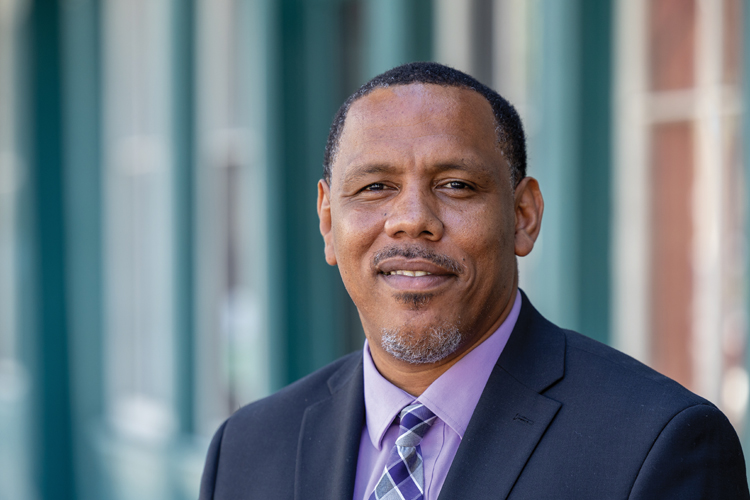Spotlight on Kenneth Hunter: Lead Organizer at the Virginia Consensus for Higher Education in Prison
In the landscape of reformative justice and educational advocacy, Kenneth Hunter shines as a pivotal figure, dedicating his life to creating educational opportunities for incarcerated individuals. Currently serving as the lead organizer for the Virginia Consensus for Higher Education in Prison (VCHEP), Hunter draws from his own experiences to spearhead initiatives aimed at transforming lives through education.
A Journey that Began Behind Bars
Kenneth Hunter’s life took a dramatic turn when he was convicted in 1999 for a nonviolent drug offense. At just 22 years old, he faced an 18-year sentence, followed by an additional five years due to a probation violation. “They made me seem like a big-time drug dealer,” Hunter reflects, recalling the circumstances that led to his imprisonment. The stringent environment of a strict religious upbringing in Lynchburg left little room for personal freedom, and by the age of 16, Hunter found himself homeless and adrift.
During his time in prison, he encountered the stark realities of incarceration. “Prison was traumatic,” he admits. Yet, despite these challenges, Hunter was fortunate enough to receive guidance and support from fellow inmates who helped shield him from the harshest realities of prison life. “Education is the one thing that could’ve prepared us to succeed,” he asserts, laying the groundwork for his future advocacy work.
The Role of Education in Transformation
Hunter’s story intersects with significant legislative changes in the U.S. educational landscape. The 1994 Crime Bill had imposed a ban on Pell Grants for incarcerated individuals, fundamentally denying them access to higher education while behind bars. However, a shift occurred in 2020 when federal legislation restored eligibility for Pell Grants, igniting hope among advocates like Hunter.
Research supports the positive impact of education on reducing recidivism. According to a decade-old study by the Rand Corporation, inmates who participate in correctional education programs are 43% less likely to re-offend than those who do not. “Education is the best determinant of recidivism,” Hunter emphasizes, highlighting the need for educational access within prison systems.
VCHEP: Mission and Impact
The Virginia Consensus for Higher Education in Prison is an initiative aimed at expanding access to college education for incarcerated individuals in Virginia. As a multi-sector coalition, VCHEP combines the efforts of various stakeholders—including corrections, higher education institutions, and public officials—to foster partnerships that create meaningful educational programs.
The organization’s mission revolves around establishing a robust system of postsecondary education in prisons across the Commonwealth. “We envision a Commonwealth in which all people, including those in prison, have access to quality higher education,” Hunter explains. The group works tirelessly to eliminate barriers to educational access, such as technological limitations and lack of resources in correctional facilities.
Overcoming Challenges and Building a Future
While many acknowledge the importance of the VCHEP’s mission, challenges persist. Hunter notes, “We haven’t had much opposition to what we’re doing,” underlining the general consensus around the value of education in reducing crime and supporting rehabilitation. However, political obstacles, such as the veto of Virginia’s House Bill 2158—which sought to foster collaboration between educational institutions and the Department of Corrections—highlight the ongoing struggle for support and resources.
Funding for VCHEP comes in part from a planning grant from the Ascendium Education Group, which supports national movements focused on educational reform for incarcerated populations.
A New Life and Continuing Advocacy
Hunter’s journey did not end with his release from prison; it merely marked a new beginning. After transitioning back into society, he found a footing in the workforce, climbing the corporate ladder in sales for a prominent furniture brand. This experience not only bolstered his confidence but also established his reputation as a capable individual thriving in a challenging world.
Today, as a part of VCHEP, Hunter is committed to advocating for educational opportunities that can change lives. “I work to extend college programs to incarcerated people,” he states, affirming his dedication to ensuring that others have the chances he was denied.
Personal Insights and Influences
Beyond his advocacy work, Hunter’s personal life remains rich and fulfilling. Living in the vibrant community of Shockoe Bottom, he is a devoted father and grandfather, playing a significant role in the lives of his family members.
Though he holds a GED from a juvenile facility, Hunter is motivated to pursue further education in political science, a testament to his belief in lifelong learning. When it comes to inspiration, he cites his grandfather’s quiet strength as a guiding influence through his life’s challenges. “His steady presence taught me the value of patience, perseverance, and dignity,” Hunter reflects.
Books also play a crucial role in his journey. Titles like “The New Jim Crow” by Michelle Alexander have profoundly influenced his understanding of systemic injustices and fueled his commitment to reform. Currently, he is engrossed in Stanley Andrisse’s “From Prison Cells to PhD,” a narrative of resilience that resonates deeply with his own experiences.
Engaging with the Community
Through VCHEP, Hunter encourages community involvement and volunteerism. He invites individuals interested in educational equity to participate in events aimed at building support networks for incarcerated students. Upcoming events, such as the “Digital Opportunity Summit” and “Power in Partnership,” provide platforms for dialogue and strategic planning to advance educational opportunities.
Kenneth Hunter’s journey from incarceration to advocacy showcases the transformative power of education. His dedication to ensuring that others can access the life-altering opportunities that he fought for remains a beacon of hope for many navigating similar paths.



